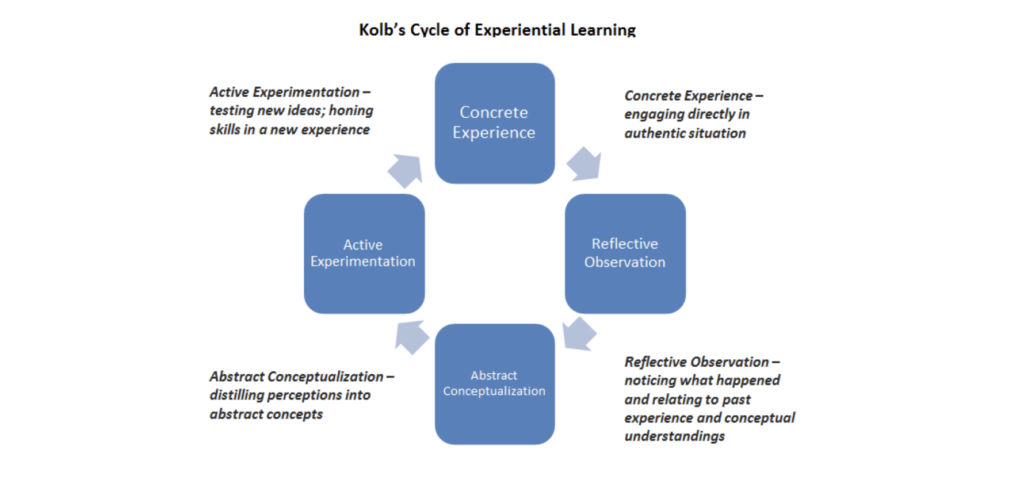Experiential learning is a type of active learning in which students “learn by doing” and then reflect on what they’ve learned. Experiential learning activities can include but are not limited to, hands-on laboratory experiments, internships, practicums, field exercises, study abroad, undergraduate research, and studio performances. This post will talk about how experiential learning is effective when it comes to learning a programming language.
The experiential learning process is depicted by Kolb’s (1984) cycle of learning as depicted in Figure 1. This procedure entails the incorporation of [1]:
a. Knowledge refers to the concepts, information, and insights obtained via formal education and prior experience.
b. Activity—applying what you’ve learned in a “real-world” situation; and
c. Reflection which is defined as “the method of assessing and interpreting information in order to generate new information”

When a learner tries to learn to program, these three components play a vital role. It might be any programming language. My pod’s Interactive Learning Design is “Basic Python for Beginners.” Students cannot expect to be experts by simply watching lectures and copying assignments since we are teaching them the foundations of Python programming. This is why many colleges offer co-op programs in Computer Science so that students may gain real-world experience. To gain practical knowledge, the student applies what they have studied in university/college to their employment.
This is the reason we will ask the students to complete a small project so that they can apply all the knowledge and skills they will develop while taking Python 100. The Following Video talks about 8 things that we should be familiar with to understand how Experiential Learning works.
After watching this video you will realize it’s important to apply your learning in the real world. As the video said learning is an endlessly reoccurring cycle, and computer science is like that. You learn every day and you get smarter day by day as learning programming is a gradual process. For example, if you have written a code and want to fix the bugs in someone’s code, you need to have some experience and that you will learn with time by learning and applying your coding skills.
It concludes that Experiential Learning is align perfectly when it comes to learning any programming language.
References:
1.Bu.edu. 2022. Experiential Learning » Center for Teaching & Learning | Boston University. [online] Available at: <https://www.bu.edu/ctl/guides/experiential-learning/> [Accessed 3 June 2022].
2. Youtube.com. 2022. [online] Available at: <https://www.youtube.com/watch?v=v74nRbWSNqk> [Accessed 3 June 2022].

poomrapee June 4, 2022
Hello Muskan, Thank you for your work on the experiential learning topic. Your blog post clarifies an experiential learning term very well. I strongly agree with you. A learner cannot be proficient in programming by only watching but experimenting. I would suggest that you should give more analysis on our pod’s final project. Overall, I agree with your analysis. Well done.
https://poom.opened.ca/wp-admin/post.php?post=158&action=edit
poomrapee June 5, 2022
Update the link: https://poom.opened.ca/comment3-on-leslies-post/?preview_id=174&preview_nonce=5f11acf33f&preview=true
poomrapee June 5, 2022
Please refer to this link to visit my comment by Poom: https://poom.opened.ca/comment2-on-muskans-post/